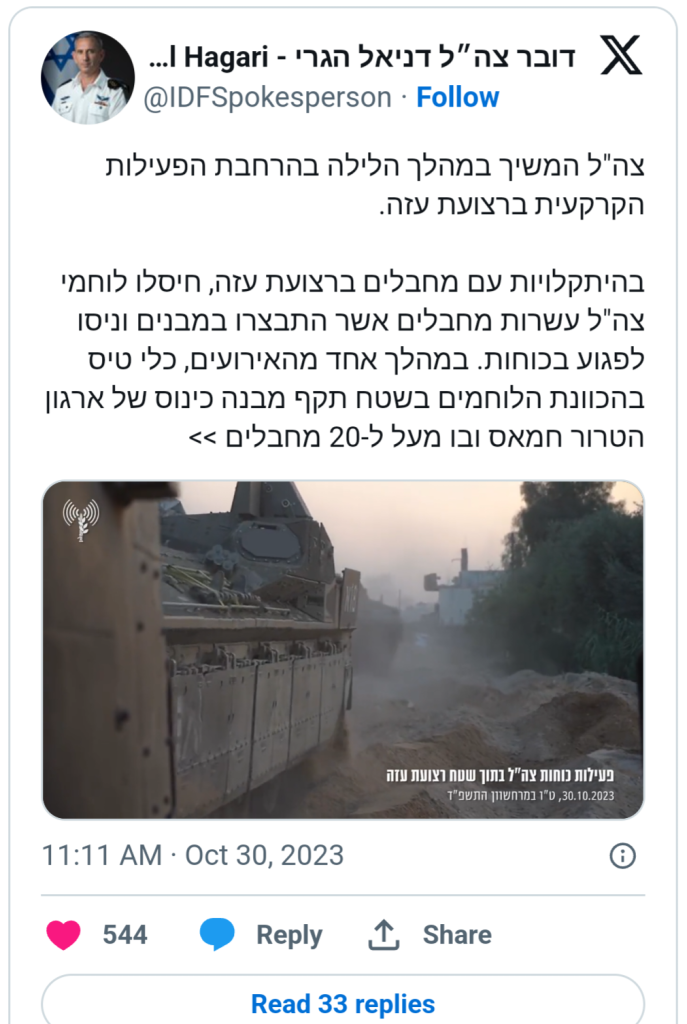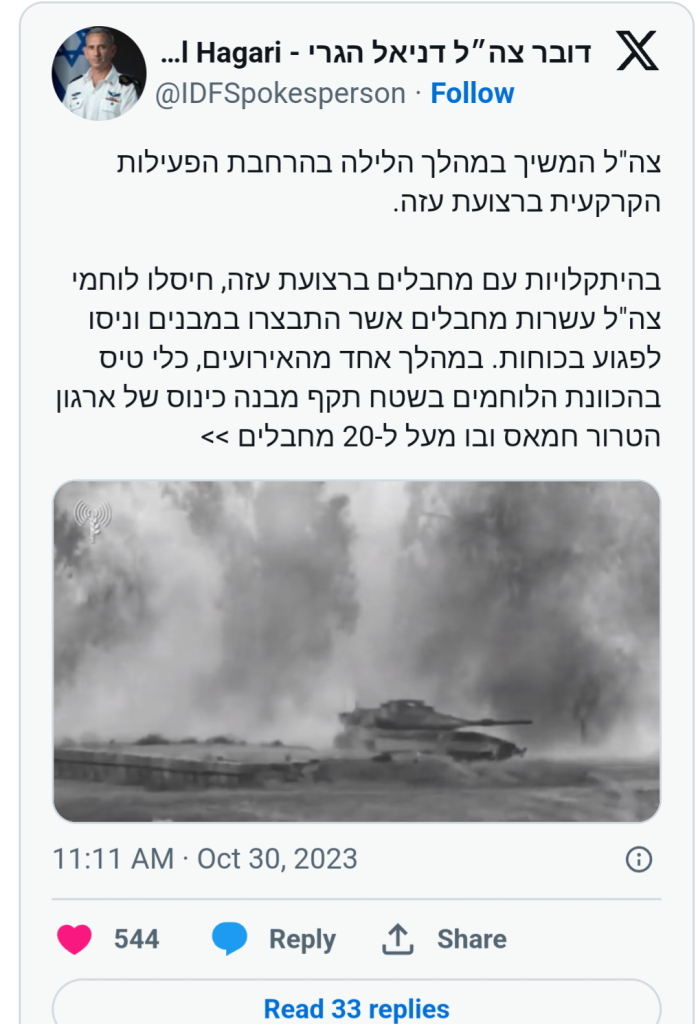In this undated photo released by the IDF on October 30, 2023, Israeli forces are seen operating inside the Gaza Strip (IDF Spokesperson.)
.
Military says new forces have entered the Strip; Palestinian witnesses report tanks blocking a key north-south road; rockets hit Netivot homes.
BY Michael Baruah.
The Israel Defense Forces pushed further into the northern Gaza Strip overnight and on Monday, engaging in a series of battles with Hamas terrorists and killing dozens of them, the military said.
By midmorning, Palestinian witnesses said Israeli tanks were on the outskirts of Gaza City and had blocked a key road linking northern Gaza to the south.
According to the army, troops, including tanks and infantry, backed by the Air Force fought overnight with Hamas members who barricaded themselves in homes and tried to attack the soldiers.
Hamas also said it was engaged in “heavy fighting… with the invading occupation force” in northern Gaza.
IDF Spokesman Rear Adm. Daniel Hagari said additional forces entered the Gaza Strip in the past day, as the military expands its ground operation.
“Overnight, troops eliminated dozens of terrorists who barricaded themselves in the buildings and tried to attack the forces that were moving in their direction,” he said, adding that fighting was ongoing.
“We are carrying out an expanded ground operation into the Strip… forces are moving towards the terrorists, the terrorists are barricading themselves in staging grounds, and we are attacking them from the air,” Hagari added
In one incident, ground troops directed the Air Force to carry out a drone strike on a Hamas staging ground, killing more than 20 terrorists, according to the IDF.
In another incident, the IDF said a fighter jet struck an anti-tank guided missile launch position and a number of Hamas operatives who were identified by ground troops near Al-Azhar University in Gaza City.
Later Monday, the IDF said troops encountered a number of Hamas cells attempting to attack them during the morning hours. Ground forces directed air force combat helicopters and drones to strike the terror cells and kill their members.
Forces also demolished anti-tank guided missile and rocket launch positions, as well as other infrastructure belonging to Hamas, the IDF said.
The military said that the ground troops and Air Force also killed several Hamas commanders on Monday.
They included the head of the terror group’s naval forces in central Gaza, Muhammed Safadi; the head of Hamas’s anti-tank guided missile array in Tuffah, Moumen Hijazi; and Muhammad Awdallah, a senior Hamas operative involved in weapon manufacturing, the IDF said.
Video released Monday by the military showed armored vehicles moving among buildings and soldiers taking positions inside a house. The exact location was not known, but military footage Saturday had shown troops moving through empty sandy areas near Gaza’s northern border fence.
Palestinian witnesses told the AFP news agency that tanks were seen in the Zaytun district on the outskirts of Gaza City. “They have cut the Salahedin road and are firing at any vehicle that tries to go along it,” said one resident.


The IDF has not commented on troop locations.
However, it said that over the past day it has carried out strikes against some 600 Hamas targets in the Gaza Strip, including weapons storage sites, hideouts, and staging grounds.
The military has not released any new information on possible Israeli casualties. On Saturday night an IDF officer was seriously hurt by a mortar impact and a soldier was moderately hurt during a battle with Hamas gunmen, both in the northern Gaza Strip.
Amid the incursion into northern Gaza, Israel continued to urge Palestinians in the area to flee to safer areas in the south, as it has for over two weeks.
Meanwhile, terror groups in the Strip kept up a steady barrage of rockets on Israel.
On Monday morning, damage was caused in the southern city of Netivot after rockets launched from the Gaza Strip scored direct hits.
The Magen David Adom ambulance service said there were no injuries in a direct rocket impact on a home and another impact on the wall of a home, but the buildings sustained significant damage.
An estimated 30 rockets were launched from Gaza at Netivot in the latest barrage, with other photos showing several Iron Dome interceptions over the area.

A picture taken from Israel’s southern city of Sderot shows smoke rising during Israeli strikes of the Gaza Strip on October 30, 2023.
Amid the fighting, an increase in aid also continued to enter into Gaza across the Egyptian border.
The United Nations humanitarian organization OCHA said 33 trucks carrying water, food and medical supplies had gone into Gaza on Sunday through the Rafah border crossing with Egypt, the largest convoy to the territory since deliveries began trickling in again over a week ago.
A US government official, speaking on condition of anonymity, said Sunday that Israel was committed to allowing 100 aid trucks into Gaza daily — a figure the UN has said was needed to meet the most basic needs. Israel has not officially confirmed such an intention.
Communications in Gaza were also largely restored after they were cut Saturday night as Israeli troops moved into the Strip amid a very heavy bombardment on Hamas tunnels and bunkers.
The restoration of communications came amid heavy US pressure on Israel, the Washington Post reported late Sunday, citing a US official.
The official said that Israel did not give a reason for shutting off communications.
“We made it clear that it had to be turned back on,” the US official told the Post, adding that communications were subsequently restored. “They need to stay back on.”
Israel has not commented on the matter. The move was seen as likely designed to limit terror operatives’ ability to communicate.
Reports in Palestinian media late Sunday claimed some communications in northern Gaza had gone dark again.
Israel has been fighting Hamas since October 7, when some 2,500 terrorists burst into Israel from Gaza by land, sea, and air, killing over 1,400 people, a majority of them civilians, in their homes and at an outdoor music festival. Hamas and allied terrorist factions also dragged at least 239 hostages — including some 30 children — back to the Gaza Strip, where they remain captive.
Israel says its offensive is aimed at destroying Hamas’s military and governance capabilities, and has vowed to eliminate the entire terror group, which rules the Strip. It says it is targeting all areas where Hamas operates, while seeking to minimize civilian casualties.
Gaza’s Hamas-run health ministry said Saturday that more than 8,000 people had been killed in the war, many of them children. The figures issued by the terror group cannot be independently verified, and are believed to include its own members killed in Gaza, and the victims of what Israel says are hundreds of errant Palestinian rockets aimed at Israel that have landed inside the Strip since the war began.
Terror groups led by Hamas have continued to barrage southern and central Israel with rocket fire, causing further deaths and injuries. There has also been sporadic rocket fire in the north from the Lebanese Hezbollah terror group and its allies. Over 200,000 people in Israel have been displaced from their homes.
Israel has been delaying an expected broadening of its ground operations in line with suggestions made by US Defense Secretary Lloyd Austin, American officials told The New York Times in a Saturday report.
One unnamed official told the newspaper that Israel altered its operations after an initial plan alarmed Washington over fears it could not achieve its military objectives. Due to efforts by Austin and other US officials, Israel refined its plan, the official said, and is currently engaging in smaller raids.
Austin has been holding almost daily conversations with Israel’s Defense Minister Yoav Gallant.
Washington, which has sent military advisers to Israel to help plan the campaign, has repeatedly stressed that the US is only advising and that Israel is making its own decisions in the war.
IDF Spokesman Rear Adm. Daniel Hagari said Sunday that amid the expanded operation, the military was working to bring home the hundreds of hostages captured by terrorists on October 7 and held in the Strip.
“We are all doing everything to bring the hostages home. It is a top priority,” he said.
Prime Minister Benjamin Netanyahu met Saturday with representatives of families whose loved ones are held in Gaza and heard from them that they favor a prisoner exchange with Hamas, swapping the captives for Palestinian security prisoners held in Israeli prisons.

As the fighting raged, United Nations and Palestinian health officials in Gaza warned that hospitals, particularly in the north, were being threatened and that a number of strikes had come very close to the hospitals.
The UN said Monday that strikes hit near Gaza City’s Shifa and Al-Quds hospitals and the Indonesian hospital in northern Gaza in recent days.
All 10 hospitals still working in northern Gaza have received repeated evacuation orders in recent days from Israel, the UN’s office for the coordination of humanitarian affairs said. Along with thousands of patients and staff, around 117,000 displaced people are staying in these facilities, it said.
Residents reported strikes near Shifa Hospital, the territory’s largest, where tens of thousands of civilians are sheltering.
On Friday, the IDF said the Hamas terror group’s main base of operations is under Shifa Hospital in Gaza City, providing visuals and intercepted audio as evidence of the terror organization’s activities. It has said Hamas uses other hospitals for similar purposes.
Strikes hit within 50 meters (yards) of Al-Quds Hospital after it received two calls from Israeli authorities on Sunday ordering it to evacuate, the Palestinian Red Crescent rescue service said. Some windows were blown out, and rooms were covered in debris. It said 14,000 people are sheltering there.
Israel ordered Al-Quds Hospital to evacuate more than a week ago, but it and other medical facilities have refused, saying evacuation would mean death for patients on ventilators.
“Under no circumstances, hospitals should be bombed,” the director general of the International Committee of the Red Cross, Robert Mardini, told CBS’s “Face the Nation.”
Gaza hospitals have been a key feature of the now three-week-long Gaza war, with Hamas on October 17 claiming that an Israeli strike targeted al-Ahli hospital in Gaza City and killed over 500 civilians. The claim was disproven within hours by Israeli and US intelligence, which found that the explosion was caused by an errant Islamic Jihad rocket aimed at Israel, occurred just outside the hospital, and killed far fewer than 500 people.
The IDF has told some one million civilians to evacuate to the southern part of the Gaza Strip ahead of an expected major ground invasion in the north of the enclave where troops are already operating. Though hundreds of thousands have moved south, many have remained, including in Gaza City. Israel has provided evidence that Hamas is preventing civilians from evacuating the war zone, setting up roadblocks and turning people back.
On Sunday, the UN said that “civil order” was crumbling in Gaza and that thousands of people had ransacked its warehouses. The UN relief agency for Palestinian refugees (UNRWA) said wheat, flour and other supplies had been pillaged at several warehouses.
Israel originally imposed a total blockade on food, water, medicine, and fuel deliveries into Gaza, but later allowed humanitarian aid convoys — not including fuel — to bring supplies in from Egypt, and has resumed some of its water supply. In peacetime, Israel provides some nine percent of the coastal enclave’s water supply.

